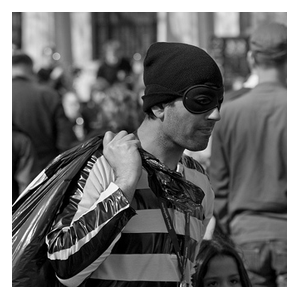Scams. Frauds. Social media. All three of these tend to go together, but only one stands well in a positive manner on its own. It's just too bad that the other two affect it so often.
It's a fact that there are bad people in the world, and they thrive on selfish acts which help them but hurt others. It could be stopped if more people were aware of them, but in this fast-paced society influenced by social media, people ignorantly cry wolf time and time again.
Below we have several tips for you to find out how exactly to use social media to raise awareness of scams and frauds. There's a right way to do it, and there's a wrong way to do it. Read on to educate yourself.
Investigate The Scam Or Fraud
Right off the bat, you need to know what kinds of scams or frauds are out there. There are a variety of resources about them on the Internet, and some of them are right on social media sites themselves.
Facebook notes several types of scams and frauds in its Help Center. Here, you will find a plethora of information about how exactly these operations work. As an extra bit of info, they don't apply just to Facebook - virtually any social network or email account can be hit with the same wave of nastiness. (On that note, we have an entire article on the top current email scams for those of you who might be interested.)
According to Facebook, here are the top social media scams and frauds:
- "Please send money" scams - A random user or cyber criminal who has accessed your friend's account sends you a message asking for cash in exchange for an equal or larger amount in return.
- Phishing scams - You are linked to a false Facebook login account page where you information can be stolen (look for subtle URL changes).
- Fraudulent emails - You receive fake emails from Facebook. Typically linked to phishing scams.
- Fraudulent notifications - You receive fake notifications from Facebook. Also typically linked to phishing scams.
Review Your Sources
The best bit of advice that I can tell you is this: review your sources. If you get nothing else from this article, remember that. How many times have you shared information only because you heard it from somebody else? Be skeptical, my friends. This world likes to embellish and exaggerate nearly everything.
Large scale scams and frauds should be rather easy to identify, and there are even sites devoted to helping you stay on top of the latest online fraud alerts. More realistically, by the time you hear about any malevolent activities, trustworthy tech news sites will have already covered it and provided details as to whether or not the issue has been resolved. Before you pass anything on, do a bit of Googling. But what about smaller, localized issues?
Examine The Details
As already mentioned, the "please send money" scam is one of the hottest hoaxes out there. This is a slightly more difficult target to identify since it's almost always an isolated case. For one, the message could be from a random user claiming to know you. For another, it could be seemingly from one of your already existing friends, but their account has merely been hacked by cyber criminal.
For a random person, you might as well hang it up. In my opinion, there is a 99.9% chance that it's a total scam. However, if you're feeling generous, see if you have any mutual friends and contact them about the issue. Don't message their buddies for background info, though. For all you know, these are just puppets run by the criminal mastermind for appearance's sake. After all, if it happened in Catfish, it could happen to you.
If perchance the message is from someone you know, find their number and call them. For those of you who are ultra-paranoid, you could even arrange for an in-person meeting to be on the safe side. If they truly want help, they may feel better speaking about it in a conversational manner. Else, this is the quickest way to get rid of a potentially big problem.
Report The Scam Or Fraud
After coming to the conclusion that you have stumbled upon a scam or fraud, your next plan of action should not be to run and tell everybody on your friends list. Instead, report the dirty scoundrel and let that piece of scum be handled by the proper authorities. But who are the proper authorities? The Internet Police? Wait. They don't exist. Instead, take it up with the social media site itself.
Almost every site features a "report user" or "report post" button. Yes, it's a little like a virtual dystopian government, but in this case, it's functional. This will spark an investigation into the user's profile, allowing them to be monitored for suspicious activity.
But let's say you are seeing a repeat offender – a man who wears many hats, a master of disguise. There actually are ways to report them to higher enforcement entities. For more information, take a look at our article on how to report email fraud and spam to authorities, for the methods found there definitely apply to social media.
Inform The Public
It's a good time to inform the public after reporting the scam or fraud. However, here are a few things not to do:
- Don't post copy-and-paste messages
- Don't share "warning" images
- Don't use scare tactics
Generally speaking, the only people who are going to pay attention to these types of updates are the ones who would share them as well. Unfortunately, these people are also the gullible ones who likely posted that picture of Bill Gates holding a sign claiming that he will give $5000 to anyone who shares it. Yeah, right.
Instead, post a brief, well-written message that is easy to process and doesn't exaggerate too much. If it's a large-scale scam, link to the article that you read, but do so with the understanding that most people will only check out the headline. Because of this, make it your duty to create a TL;DR version that is informational and unsensational. As for smaller scams, provide an explanation, and if you feel like calling somebody out in a "please send money" scam, link to their profile. That won't hurt a thing.
Alternatively, you could send out a group message to those that you trust. Most people will not likely see your one status update, but if you get enough people to share the same information, you increase the number of social media users who are aware. This can create a chain reaction of shares, and in the end, that's a good thing.
The Internet is a community like any other. In other words, you should consider it your responsibility to be a productive citizen who contributes to the well-being of your neighbors whenever you can. Be sure to remain calm and level-headed about anything you post.
Conclusion
The Internet is a scary place, and social media doesn't help. That doesn't mean social media is a bad thing, though. Criminals tend to use almost anything to carry out their activities. Even stuffed animals are sometimes filled with cocaine.
Have you ever fallen victim to a social media scam or fraud? If you haven't, do you know of anyone has? How do you typically raise scam awareness and share information about scams and frauds? Did these tips help you?
Image Credits: f4niko, shining.darkness, NS Newsflash, Lazurite, nereocystis, Grégoire Lannoy






